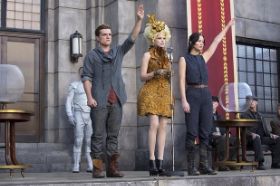 It would be so easy to dismiss the Hunger Games sequel, Catching Fire, as just another in a long line of Hollywood money grabs, churned out too quickly to capitalize on the frenzied popularity of the original, which broke box office records just a year ago. After all, it’s got everything an eye-rolling cynic would expect: a massive fan base made up of mostly “young adults,” drawn from the trilogy of Suzanne Collins bestsellers that captured the demographic’s imagination, a populist star in Jennifer Lawrence who is a favorite not only with the masses but with the critics (and has her Oscar to prove it) and it features a fantasy setting with a love triangle, which allows far too many easy Twilight-comparison jokes. Yes, The Hunger Games: Catching Fire is a late-night joke waiting to happen.
It would be so easy to dismiss the Hunger Games sequel, Catching Fire, as just another in a long line of Hollywood money grabs, churned out too quickly to capitalize on the frenzied popularity of the original, which broke box office records just a year ago. After all, it’s got everything an eye-rolling cynic would expect: a massive fan base made up of mostly “young adults,” drawn from the trilogy of Suzanne Collins bestsellers that captured the demographic’s imagination, a populist star in Jennifer Lawrence who is a favorite not only with the masses but with the critics (and has her Oscar to prove it) and it features a fantasy setting with a love triangle, which allows far too many easy Twilight-comparison jokes. Yes, The Hunger Games: Catching Fire is a late-night joke waiting to happen.
If only it weren’t so good.
Now don’t get me wrong, I’m not lining up to give Hunger Games any Oscars here. Jennifer Lawrence is a wonderful actress, but she does nothing to show you that she’s an Oscar winner in Catching Fire. Nor does Philip Seymour Hoffman, who is also featured. Nor does Woody Harrelson, Jeffrey Wright, Amanda Plummer, or Donald Sutherland, other actors who I think should have Oscars. Because The Hunger Games: Catching Fire is not a movie about performances. And it shouldn’t be. Because if you’re going to see Catching Fire for the performances, you are missing the point.
The Hunger Games is about thoroughly entertaining and imaginative storytelling, period. Yes, I read the books and I loved them. Yes, the premise is dark, I agree. I have heard from many people that they find the premise too dark to tolerate: who wants to see a movie that features children killing each other for sport. You’re right, that may be too dark for kids. But I’m an adult and I found the concept to be fascinating in the bigger picture. Because the bigger picture here is The Hunger Games is about survival and revolution. And, to be honest, if you want to really teach your kids about the bigger picture, oppression is a part of history, as is revolution, and in this fantasy story, set in another world in another time, there lies a pretty fantastic story that I’ll tell you is much more fun to sit through than Les Miserables.
The proof of the importance of the story here is not only in the fact that the movie is based on the second of Suzanne Collins’s hugely popular “Hunger Games” trilogy, “Catching Fire,” but that little-known director Francis Lawrence brought in Oscar-winning screenwriters Simon Beaufoy (Slumdog Millionaire) and Michael Arndt (Little Miss Sunshine) to adapt Collins’s novel to the screen. The result is a rare PG-13 action movie with depth and, dare I say it—soul.
Still, the sad truth is, most have either already pre-judged The Hunger Games or have already embraced it, so selling it or panning it generally will fall on deaf ears. The movie itself is really great, especially for a sequel. It’s exciting, well-paced, avoids sappiness yet finds the heart, and leaves you ready for more. If you are a fan of the books, you will not be disappointed. And if you are one who has dismissed The Hunger Games altogether because of either its subject matter or its pop culture status, I encourage you to reconsider. The books—and the movies—are more than empty-headed characters and paint-by-numbers plots. Collins uses that crazy thing that we see far too little of these days—imagination—and the result is a revolutionary story with a strong, independent woman as the hero. I’d say that’s a far better thing than anything with “Shades” in the title.
